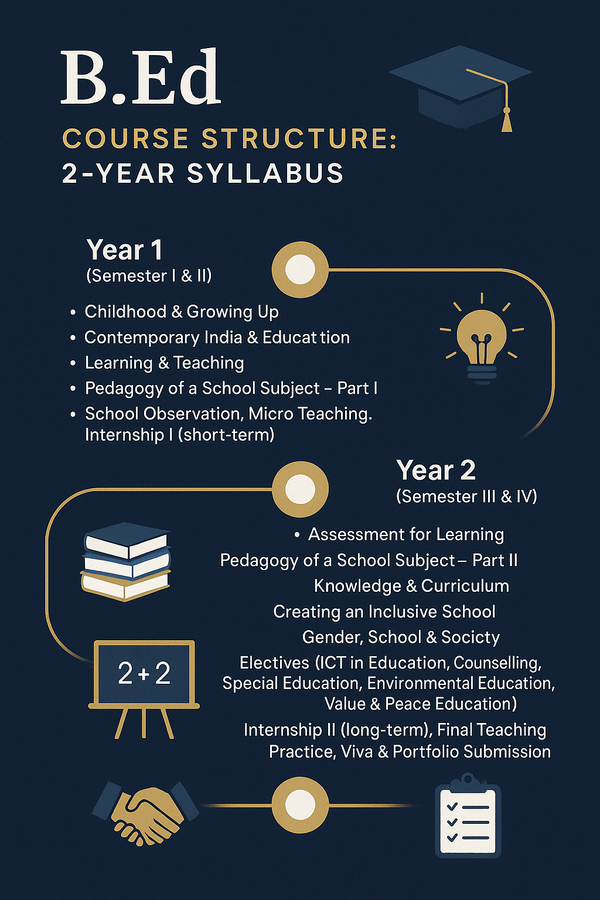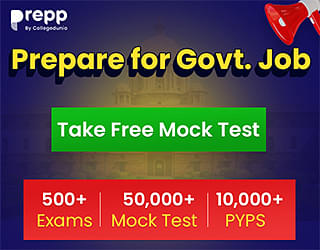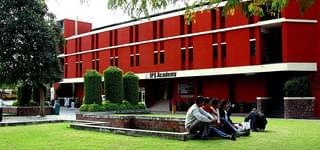B.Ed General Latest Updates
05 Jan, 2026 UP B.Ed JEE 2026 Dates Out. Registration Starts February 10, 2026. Exam from April 20-25, 2026. Check Dates Here.
03 Jan, 2026 CUET (UG) 2026 registration has been started @cuet.nta.nic.in. Last date to apply by 30 January 2026. Apply Here
The B.Ed syllabus is a 2-year course, developed by NCTE, designed to prepare teachers through theory and practice. The core subjects are: Childhood & Growing Up; Learning & Teaching; Pedagogy of a School Subject: Assessment for Learning; Creating an Inclusive School, along with a few electives, like ICT in Education; Special Education. Candidates undergo practical work in microteaching, school-based observation, and internship practices, so that they are prepared for the classroom. The entry requirement is for a candidate to have a bachelor’s degree and a minimum of 50% marks. The admission process will also be either an entrance or based on merit.
Admission is completed through entrance tests like the CUET PG, UP B.Ed JEE, or state CETs, although some institutions allow for admission based on merit. The program combines theoretical and practical study to analyze and develop teaching abilities, educational psychology, and classroom management skills.
Also Read
B.Ed Entrance Exam Syllabus- B.Ed Syllabus: Semester-wise
- What elective courses are included in the BEd?
- Key Syllabus Topics: Core Subjects
- B.Ed Entrance Exam: Syllabus
4.1 How many subjects are in the BEd entrance exams?
- What are the practical components of BEd?
- Top 10 Books Recommended for B.Ed
- What are the subjects of the BSc-BEd Integrated course?
- What is the syllabus of BHU BEd?
- What is the IGNOU BEd Entrance Syllabus?
- B.Ed Online Courses
- B.Ed Syllabus: FAQs
B.Ed Syllabus: Semester-wise
The B.Ed semester-wise syllabus consists of theoretical components and practical experiences. The first year contains foundational courses (Childhood & Growing Up, Contemporary India & Education, Learning & Teaching, and Pedagogy of a School Subject - Part I), and short field placements/internships. The second year comprises courses (Assessment for Learning), pedagogical studies, learning about inclusivity and gender studies, elective courses, and long-term teaching practice.
B.Ed 1st Year Syllabus
| Semester | Core Subjects | Practical |
|---|---|---|
| Semester I |
|
|
| Semester II |
|
|
B.Ed 2nd Year Syllabus
| Semester | Core Subjects | Practical |
|---|---|---|
| Semester 3 |
|
|
| Semester 4 |
|
|

What elective courses are included in the BEd?
In the B.Ed programme, students will also take major electives that allow students to work toward specific areas of education that interest them and/or relate to their professional goals in terms of their education and employment. Major electives are courses that add experience and depth beyond the core curriculum, allowing for a more intensive knowledge base and skill set for ICT in Education, Guidance & Counselling, Special Education, Environmental Education, and Value & Peace Education.
| Electives | Syllabus Highlights |
|---|---|
| ICT in Education |
|
| Guidance and Counselling |
|
| Special Education |
|
| Environmental Education |
|
| Value and Peace Education |
|
Key Syllabus Topics: Core Subjects
The core subjects of the B.Ed. syllabus centers upon building a foundation for teaching and education. These subjects are the following: Childhood and Growing Up, which examines child psychology and development; Contemporary India and Education, which looks at policies, issues, and reforms in education; Learning and Teaching, which highlights theories of learning and pedagogy; and Assessment for Learning, which deals with student evaluation practices and their progression.
| Core Subjects | Syllabus Topics |
|---|---|
| Childhood & Growing Up | Growth & Development stages, Theories of Development, Role of family & society, Individual differences, Learning styles, Contemporary child issues |
| Contemporary India & Education | Constitutional provisions, Education & social change, Equity & inclusion, Challenges in Indian education, Role of education in national integration, Educational commissions & reforms |
| Learning & Teaching | Nature & process of learning, Learning theories (Behaviourism, Constructivism, Cognitivism), Factors affecting learning, Teaching models, Classroom management, Reflective teaching practices |
| Pedagogy of a School Subject | Subject nature & scope, Objectives & learning outcomes, Curriculum analysis, Teaching strategies, Lesson & unit planning, Evaluation & remedial teaching |
| Assessment for Learning | Purpose & types of assessment, Tools & techniques, CCE (Continuous and Comprehensive Evaluation), Test construction, Grading & reporting, Challenges in assessment |
| Knowledge & Curriculum | Meaning & types of knowledge, Curriculum principles & approaches, Curriculum development, Hidden & core curriculum, Curriculum evaluation, Teacher’s role in implementation |
| Creating an Inclusive School | Concept & philosophy of inclusion, Policies & laws, Needs of children with disabilities, Inclusive classroom strategies, Community collaboration, Assistive devices & technology |
B.Ed Entrance Exam: Syllabus
The syllabus for the B.Ed entrance exam typically includes five sections. These are: General Knowledge & Current Affairs, which is assessed for awareness of specific national, international, and educational news; Teaching Aptitude, which evaluates the teaching-learning process, pedagogy and classroom management; Language Proficiency in English or a regional language as applicable, assessing grammar, vocabulary and comprehension; Logical & Analytical Reasoning, which includes problem solving, interpretation and critical thinking skills; and Subject-Specific Knowledge, asks questions from the undergraduate subject area of History, Political Science, Sociology, Economics, Science or Mathematics.
| Exam Name | Conducting Body | Exam Mode | Key Sections in Syllabus |
|---|---|---|---|
| CUET PG (B.Ed) | National Testing Agency (NTA) | Online (CBT) | Language Comprehension, Teaching Aptitude, General Awareness, Reasoning, Subject Knowledge |
| IGNOU B.Ed Entrance Exam | Indira Gandhi National Open University | Offline | General English Comprehension, Logical & Analytical Reasoning, Educational & General Awareness, Teaching-Learning |
| UP B.Ed JEE | Bundelkhand University (or designated state university) | Offline | General Knowledge, Language (English/Hindi), General Aptitude, Subject Ability |
| Maharashtra B.Ed CET | State CET Cell, Maharashtra | Online | Teaching Aptitude, General Knowledge, Mental Ability |
| DU B.Ed Entrance Test | Delhi University | Online | General Awareness, Reasoning, Subject Knowledge, Language Proficiency |
| BHU B.Ed Entrance Exam | Banaras Hindu University | Online | Teaching Aptitude, General Awareness, Mental Ability, Subject Knowledge |
| State-level CETs (e.g., MP, Rajasthan) | State Governments / Universities | Online / Offline | General Awareness, Teaching Aptitude, Reasoning, Subject Knowledge |
How many subjects are in the BEd entrance exams?
BEd entrance exams are conducted to select students for BEd courses in top colleges. The BEd entrance exam is generally divided into two sections and covers the following subjects.
- Section A - General Knowledge, General Aptitude, Current Affairs related to education.
- Section B - Life Sciences (Zoology and Botany), Physics, Chemistry.
What are the practical components of BEd?
Practical components in BEd are included to provide you with real-world teaching experience. It will help you to develop skills by applying the knowledge you gained through the curriculum. Practical components are incorporated in the form of teaching internships and school exposures during the last year. Other than internships, there are also field engagements that allow you to incorporate theoretical knowledge in real-world situations.
Top 10 Books Recommended for B.Ed
A combination of books are available for B.Ed preparation that cover both depth in core subjects and liberty in what is considered essential content for entrance exams. Traditional books such as “Childhood and Growing Up” (NCERT), “Contemporary India and Education” (Aggarwal & Gupta), and “Learning and Teaching” (J.C. Aggarwal) are good books for any B.Ed. program for getting clothed in important educational theories and pedagogical practices.
| Book Title | Author |
|---|---|
| Psychology of Childhood and Growing Up | S.K. Mangal |
| Philosophical and Sociological Foundations of Education | R.P. Pathak |
| Essentials of Educational Psychology | S.K. Mangal |
| Teaching of Mathematics | R.C. Sharma |
| Teaching of Science | R.P. Bhatnagar, Vidya Agarwal |
| Teaching of English | Geeta Rai |
| Educational Measurement and Evaluation | J.C. Aggarwal |
| Curriculum Development: Theory and Practice | Hilda Taba |
| Inclusive Education: A Practical Guide to Supporting Diversity in the Classroom | Peter Clough, Jenny Corbett |
| ICT in Education | S.C. Sharma |
What are the subjects of the BSc-BEd Integrated course?
BSc-BEd integrated is a dual-degree course combining a BSc with a BEd. It is a 4-year long course in which you will simultaneously gain knowledge in the disciplines of science and education. The syllabus is comprehensive compared to a regular BEd curriculum. You can check the syllabus of the BSc-BEd integrated course in the following table.
| Ist Semester Syllabus | |
|---|---|
| Animal Diversity | ICT |
| Calculus | Learning and Teaching |
| Cell Biology | Mechanical |
| Communication Skills I | Plant Diversity |
| IInd Semester Syllabus | |
| Animal Physiology | Organic Chemistry |
| Communication Skills II | Creative and Critical Thinking |
| Contemporary India | Environmental Studies |
| Creative and Critical Thinking | Biochemistry |
| Inorganic Chemistry | Electricity and Magnetism |
| IIIrd Semester Syllabus | |
| Plant Physiology | Plant Anatomy |
| Differential Equation | Developmental Biology |
| Waves and Optics | Childhood and Growing Up |
| IVth Semester Syllabus | |
| Algebra | Physical Chemistry |
| Analog and Digital Systems | Learning Assessment |
| Analytical Skills | Knowledge Curriculum |
| Creation of Inclusive Schools | – |
| Vth Semester Syllabus | |
| Linear Algebra | Entomology |
| Linear Algebra | Solid State Physics |
| Revolutionary Biology | Physical Science |
| Soft Skills | Pedagogy of Life Science |
| Pedagogy of Mathematics | Project I |
| VIth Semester Syllabus | |
| Analytical Chemistry | Physical Science |
| Multivariate Calculus | Knowledge and Curriculum |
| Elective I | Internship |
| Project II | – |
| VIIth Semester Syllabus | |
| Service Learning | Internship II |
| Learning Resource Projects | – |
| VIIIth Semester Syllabus | |
| Elective II | Reasoning Ability |
| Current Affairs | Life Skills |
| Self Understanding | School Management |
| Gender, School and Management | – |
What is the syllabus of BHU BEd?
Banaras Hindu University (BHU) is one of the best colleges in India to pursue BEd. BHU BEd syllabus is comprehensive providing you with the knowledge and skills to teach effectively in schools. You can check the BHU BEd syllabus in the following table.
| Ist Semester Syllabus | |
|---|---|
| Psychology of Learner and Development | Contemporary India and Education |
| Assessment for Learning | Indian Perspective of Education |
| Discipline and Subjects: Mathematics, Science, Social Science and Languages | Reading and Reflecting on Texts |
| Creative and Co-scholastic Activities in School | Internship |
| IInd Semester Syllabus | |
| Learning and Teaching | Understanding the School and Classroom Management |
| Pedagogy of a School Subject I and II | Understanding and Application of ICT |
| Games, Sports and Yoga in School | Internship |
| IIIrd Semester Syllabus | |
| Internship | – |
| IVth Semester Syllabus | |
| Inclusion, Education and School | Knowledge and Curriculum |
| Knowledge, Peace, Health and Values for Quality Life | Elective Paper |
What is the IGNOU BEd Entrance Syllabus?
IGNOU conducts an entrance exam every year to select students for the BEd course. It will test your aptitude in different areas along with your knowledge in different subjects. The syllabus is divided into two sections which you can check below.
| Section A | |
|---|---|
| General English Comprehension | Logical and Analytical Reasoning |
| Education and General Awareness | Teaching-Learning and School Topics |
| Section B | |
| Science | Mathematics |
| Social Science | Hindi |
| English | – |
B.Ed Online Courses
Several online courses for B.Ed aspirants are available on platforms like SWAYAM, Coursera, Udemy, and IGNOU’s online programs, offering flexibility and accessibility for learners. These courses cover areas such as educational psychology, pedagogy, curriculum design, classroom management, and teaching methodologies, helping students build strong conceptual knowledge along with practical teaching skills.
| Platform | Focus Area | Key Benefits | Free/Paid |
|---|---|---|---|
| SWAYAM (NPTEL) | Educational Technology, Digital Teaching Tools | Free course with certification, covers ICT integration in classrooms | Free |
| edX (University of British Columbia) | Inclusive Education | Strategies for diversity, equity, and inclusion | Free to audit / Paid for certificate |
| Coursera (University of London) | Pedagogy & Curriculum | Learning theories, lesson planning, and assessment methods | Free to audit / Paid for certificate |
| IGNOU Online | Counselling & Student Support | Mental health, career guidance, and problem-solving | Paid |
| FutureLearn | Educational Assessment | Modern assessment strategies and feedback techniques | Free to audit / Paid for certificate |
| Alison | English Pedagogy | Communicative English teaching and grammar instruction | Free / Paid for certificate |
B.Ed Syllabus: FAQs
Ques. What is the duration of the B.Ed course?
Ans. The Bachelor of Education (B.Ed) program usually spans 2 years, divided into 4 semesters. Each semester includes both theory and practical components such as school internships, projects, and workshops. Some universities also offer a 1-year B.Ed for postgraduates or a 4-year integrated B.A/B.Sc-B.Ed program under NEP 2020. The course is designed to provide both academic knowledge and professional teaching skills.
Ques. What are the core subjects in the B.Ed syllabus?
Ans. The B.Ed syllabus includes foundational papers like Childhood and Growing Up, Contemporary India and Education, Learning and Teaching, Curriculum and Pedagogy of School Subjects, Assessment for Learning, and Educational Technology. These subjects focus on preparing future teachers with a strong understanding of child psychology, pedagogy, and assessment methods. Apart from theory, practical training in schools helps students gain real-world classroom experience.
Ques. What electives are offered in B.Ed?
Ans. Along with core subjects, B.Ed offers a wide range of electives that allow students to specialize in areas of their interest. Common electives include Guidance and Counselling, Environmental Education, ICT in Education, Inclusive Education, Health and Physical Education, and Value Education. These subjects are meant to deepen knowledge in specific domains and enhance teaching skills for diverse classroom environments.
Ques. What is the syllabus of the B.Ed entrance exam?
Ans. The entrance exam syllabus is designed to test both general aptitude and subject knowledge. It covers General Knowledge & Current Affairs, Teaching Aptitude, Language Proficiency (English or regional language), Logical & Analytical Reasoning, and Subject-Specific Knowledge based on the candidate’s graduation background. The questions are mostly MCQ-based, focusing on problem-solving, reading comprehension, and awareness of educational trends.
Ques. What is the exam pattern of B.Ed entrance exams like CUET or state-level tests?
Ans. The B.Ed entrance exam pattern usually includes objective-type questions divided into multiple sections. For CUET and most state-level exams, the paper consists of around 100–150 questions covering General Knowledge, Teaching Aptitude, Language Proficiency, Reasoning, and Subject-Specific Knowledge. Each section generally carries 20–30% weightage, and candidates are given 2–3 hours to complete the test. Some exams also have negative marking, while others do not.
Ques. Is there negative marking in B.Ed entrance exams?
Ans. Negative marking depends on the specific entrance exam. For example, in CUET B.Ed, +5 marks are awarded for correct answers and -1 mark is deducted for wrong answers, which means students must answer carefully. However, in exams like UP B.Ed JEE or DU B.Ed, there may not be negative marking, making it slightly more student-friendly. Hence, aspirants should check the guidelines of the university or exam they are applying for.
Ques. Which books are best for B.Ed preparation?
Ans. Candidates can prepare using a mix of NCERT books for Class 6–12 for building strong basics, along with specialized guides like R. Gupta’s B.Ed Entrance Exam Guide, Arihant’s B.Ed Entrance Exam Book, and Trueman’s B.Ed Entrance Exam. For pedagogy and teaching concepts, J.C. Aggarwal’s Learning and Teaching and NCERT’s Childhood and Growing Up are highly recommended. Solving previous years’ question papers and mock tests also helps in exam preparation.
Ques. Can I prepare for B.Ed entrance exams online?
Ans. Yes, online preparation is now very popular for B.Ed aspirants. Platforms like SWAYAM, NPTEL, and IGNOU’s online programs offer free government-backed courses, while private platforms like Udemy, Byju’s, and Unacademy provide paid coaching with mock tests and live classes. YouTube also has many free resources for practice. These courses cover teaching aptitude, pedagogy, and reasoning, making them convenient for self-paced learners.
Ques. Is the B.Ed syllabus the same in all universities?
Ans. The core framework of the B.Ed syllabus is regulated by NCTE (National Council for Teacher Education), which means most universities follow a similar structure. However, there can be slight variations in electives, specializations, and practical training methods across different states and institutions. For example, some universities offer electives in ICT and Environmental Education, while others may emphasize Inclusive Education or Counselling.
Ques. Which subjects can I choose for subject-specific knowledge in B.Ed?
Ans. The subject-specific section of B.Ed depends on the candidate’s undergraduate degree. Arts students can choose subjects like History, Political Science, Sociology, Geography, or Economics, while Science graduates usually opt for Physics, Chemistry, Biology, or Mathematics. Language graduates can select English, Hindi, or regional languages. Choosing the right subject ensures candidates can comfortably teach it in schools later.




![St. Xavier's College - [SXC]](https://image-static.collegedunia.com/public/college_data/images/appImage/14883539151444128217SXCKOLKATANEW.jpg?h=150&w=320&mode=stretch)

![Guru Gobind Singh Indraprastha University - [GGSIPU]](https://image-static.collegedunia.com/public/college_data/images/appImage/25450_1.jpg?h=150&w=320&mode=stretch)
![Acharya Narendra Dev College - [ANDC]](https://image-static.collegedunia.com/public/college_data/images/appImage/15560_ANDV_NEW.jpg?h=150&w=320&mode=stretch)

![Patna Women's College - [PWC]](https://image-static.collegedunia.com/public/college_data/images/appImage/3394_PWC.jpg?h=150&w=320&mode=stretch)



Comments